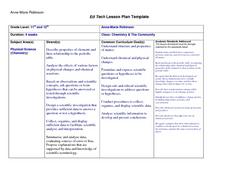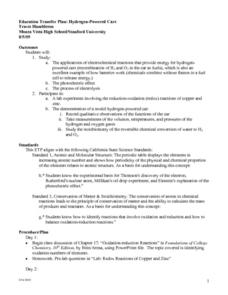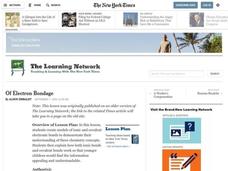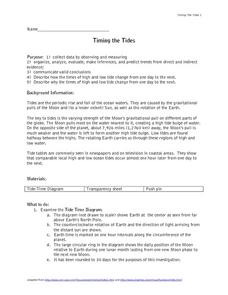Curated OER
Oxidation and Salt
Students study the reaction on iron in water, air, and sodium chloride. They create a situation that shows this process and gives them the opportunity to hypothesize what, why, and how. They keep records and do an oral and written ...
Curated OER
Chemistry & The Community
Students complete a Webquest which investigates the chemistry in items such as shampoo. They research the Internet, perform a lab experiment, and write a scientific lab report with their findings. Upon completion of the activities, the...
Curated OER
What's the Matter? Locating Electrons in an Atom
Learners roll dice in order to simulate the probability of locating an electron in a certain region around the nucleus.
Curated OER
States of Matter
Learners discuss a given set of questions based on Chemistry and matter and review a glossary of terms. They conduct experiments on each state of matter: "Dry ice and water, Dry ice and soap and Dry ice and Isopropyl Alcohol." and...
Curated OER
Chemical Formulas
Students assess how to go from writing ionic chemical formulas to nomenclature and naming chemical compounds. They brainstorm former studies and share their thoughts in small groups. A list of everyday products (shampoos, toothpaste,...
Curated OER
Mining an Ore
Students investigate how to determine the percent composition of a mineral in an ore. In this mining an ore lesson plan, students use chocolate chips cookies to represent an ore and they remove precious minerals (the chocolate chips)...
Curated OER
Metals or Nonmetals? The Families of Elements
Fourth graders, in groups, compile information on groups of elements. They study Alkali Metals, Alkaline Earth Metals, Halogens, and Noble Gases.
Curated OER
Semiconductors
Students investigate the properites of a semiconductor device known as a diode. They recognize a diode as a one way conducting device. They describe alternating current and the use of a diode to convert it to direct current. Students...
Curated OER
Changes in the Copper Penny
Third graders explore the difference between a physical change in a substance and a chemical change. students study the volume, density, altering shape and chemistry of a copper penny.
Curated OER
Hydrogen Powered Cars
Students apply the principles of chemistry to investigate the concept of how a hydrogen powered car works. They study the electrochemical reactions that provide the energy source. Students also record observations in the functioning of a...
Curated OER
Ion (Derstand) Bonding through Energy Level Diagrams
Ninth graders investigate ionic bonding through energy level diagrams. For this ion bonding lesson plan, 9th graders observe demonstrations to show energy level diagrams using magnets to represent the subatomic particles. Students fill...
Curated OER
Of Electron Bondage
Students create models of ionic and covalent electronic bonds to demonstrate their understanding of these chemistry concepts. They explain how both ionic bonds and covalent bonds work so that younger students can understand.
Curated OER
Combating Corrosion
Students perform an experiment to show the chemical reactions that occur when metal corrodes. They apply the results of the experiment to the conservation efforts of art curators trying to restore an ancient Greek bronze. This lesson...
Curated OER
What is an Atom?
Third graders understand that the smallest particle is an atom. In this matter lesson, 3rd graders make a piece of aluminum smaller and smaller to see that what's left is still aluminum. Students recognize that cutting into smaller...
Curated OER
Nonmetals
Learners research about the chemical processes involved in cave formation. In this chemistry lesson, students draw or find a cave picture with stalagmites and stalactites online. They write a brief caption and share them with the class.
Curated OER
Properties of Matter (Biomaterial Through Nanotechnology)
Students investigate friction between different surfaces. In this physics lesson, students research biomaterials that can reduce friction. They calculate efficiency using a mathematical formula.
Curated OER
Mathematical and Chemical Relationships of Stoichiometric Problems
Young scholars review key words used in stoichiometry such as mole, molar mass, Avogadro's number, and mass - mole relationships. They participate in a series of small experiments to explore solving stoichiometry problems in the...
Curated OER
Transition Metals
Middle schoolers identify and describe transition metals. They discuss alloys and their benefits. Students research one common, alloy, its composition, properties, and uses. They are asked for some common properties of most transition...
Curated OER
Why are Electrons Important?
Students write electron configuration of elements using atomic numbers and they identify valence electrons. In this electrons lesson plan, students observe a demonstration showing the space-filling property of an electron. They also...
Curated OER
Mass Spectrometer
In this mass spectrometer worksheet, high schoolers read about how a mass spectrometer determines the elements in gases around Earth. Students answer 3 questions and identify the elements in a graph found by a mass spectrometer.
Curated OER
Edible Atom/Molecule
Upcoming chemists construct atom or molecule models out of candy. This is a classic idea that learners really enjoy; however, this lesson plan is vague. There is no instruction about the structure of atoms or molecules. Make sure you...
Curated OER
Chemistry: Metals and Non-Metals
Students conduct an experiment to test the reactivity of metals and non-metals. In this chemistry instructional activity students test metals with different chemicals to observe the reaction. The results are used to categorize the metals.
Curated OER
Comparing Properties of Elements & Compounds
In this elements and compounds worksheet, students review the physical properties of different compounds and elements using websites for information. This worksheet has 1 graphic organizer and 1 short answer question.
Curated OER
Timing the Tides
Students collect data and describe how and why the high and low tides change from day to day. In exploring tides activity students study tides by taking notes, recording data and analyzing their findings.

























